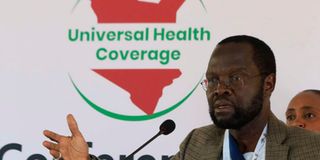4,000 UHC interns demand jobs on permanent, pensionable terms

Kisumu Governor Anyang Nyong'o speaks during a Universal Health Coverage conference in Nyeri in 2018.
What you need to know:
- The interns were distributed as clinical officers, registered and enrolled nurses, pharmaceutical and medical laboratory technologists, community oral health officers, radiographers and assistant public health officers.
- The other clusters were assistant health records and information management officers, nutrition and dietetics technologists, assistant occupational therapists, orthopaedic trauma technicians and assistant health promotion officers.
The 4,000 interns recruited by the government in 2020 for the pilot Universal Health Coverage (UHC) are now demanding that they be absorbed on permanent and pensionable terms as had been promised.
Most of the interns had graduated within the previous five years before they were hired. Their demand now raises concern about opportunities for the youth in accessing government jobs.
In a letter dated December 28, 2022, the interns, through their national spokesman, Mr Sylvester Gero, appeals to President William Ruto to fulfil the promise made by his predecessor Uhuru Kenyatta. Mr Gero observed that Health Cabinet Secretary Susan Wafula does not appear versed in the issue “and that is why we seek to clarify to her”.
The interns were distributed as clinical officers, registered and enrolled nurses, pharmaceutical and medical laboratory technologists, community oral health officers, radiographers and assistant public health officers. The other clusters were assistant health records and information management officers, nutrition and dietetics technologists, assistant occupational therapists, orthopaedic trauma technicians and assistant health promotion officers.
Most of them were posted to level 1–3 of the healthcare structure, and the rest to level 4–6 to enhance the provision of primary and secondary healthcare. “These interns were to be found on site by the Covid-19 pandemic and again their work structure changed to that of frontline soldiers in the crisis that even claimed the lives of some health workers,” Mr Gero says.
They want Ms Wafula to initiate round-table talks involving national and county governments on how to absorb them. They fear that their plight might be trashed on the grounds that it was an initiative of the Kenyatta administration, whose programmes the successor appears not too keen on continuing.
Mr Kenyatta had vouched to leave behind affordable healthcare through the UHC. “Our point of reference is the 2022 circular from the Public Service Commission directing ministries to employ entry-level civil servants who were appointed from 2019 up to date and which is yet to be implemented,” Mr Gero says.
He added that the UHC interns had been recruited for a three-year contract, which has since elapsed, with the absorption circular in their favour having been ignored so far. They accuse the government of indifference, saying they have not received any communication since the programme ended.
“Only our National Health Insurance Fund (NHIF) comprehensive cover was paid upfront for only one year, but all other aspects of the contractual agreements remain unhonoured,” the letter reads, adding they have been subjected to mental torture and their careers thrown into a crisis.
“The interns are in a dilemma and are frustrated. Our concern to the Health ministry, the Director Public Service Commission and the Council of Governors is that they are subjecting us to unnecessary distress by continuing to keep us in the dark.”
Several health officials who spoke to Healthy Nation commended the interns for playing a pivotal role in bridging the human resource gap during the piloting of the UHC and during the Covid crisis.
“It was the first time we were able to post an occupational therapist to the village health centres. Before UHC interns came, most children with cerebral palsy and burns had to travel long distances in search of clinical management. But we risk reversal of the gains if these interns are withdrawn,” said a director of medical services in a Mt Kenya county.
“In regions like North-Eastern, the distance covered to access an occupational therapist costs an average of Sh1,200, but with the interns in place, the cost was reduced, hence it would be reckless for this government not to absorb them.”
On December 22 during a situational report address to the nation, CS Wafula hinted that she was also concerned about the delay to absorb the interns but appeared to blame the county governments.
“Yes, we have them and they were recruited and deployed in various counties on three-year contracts. We remain aware that human resource is a key asset,” she said.
“Whereas it was resolved that these interns be absorbed into a permanent workforce when their contracts expired, it has not been the case. The counties have made different progress in their absorption rates. Absorption of the remaining staff remains a priority and will be a big boost to ongoing efforts to strengthen health systems for service continuity and we will continue to support the counties to achieve the desired results.”





